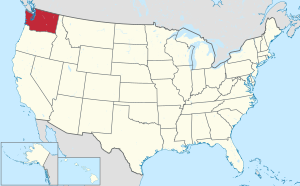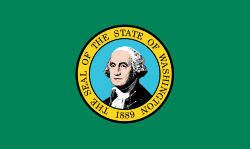Washington (state)
Washington, officially the State of Washington, is a state in the Pacific Northwest region of the United States. It is north of Oregon, west of Idaho, east of the Pacific Ocean, and south of British Columbia. (British Columbia is part of Canada.)
Washington | |
|---|---|
| State of Washington | |
| Nickname: "The Evergreen State" (unofficial) | |
| Motto(s): Al-ki or Alki, "bye and bye" in Chinook Jargon | |
| Anthem: "Washington, My Home" | |
 Map of the United States with Washington highlighted | |
| Country | United States |
| Before statehood | Washington Territory |
| Admitted to the Union | November 11, 1889 (42nd) |
| Capital | Olympia |
| Largest city | Seattle 1,936,826 |
| Largest metro and urban areas |
(Vancouver): 314,106
|
| Government | |
| • Governor | Jay Inslee (D) |
| • Lieutenant Governor | Cyrus Habib (D) |
| Legislature | State Legislature |
| • Upper house | State Senate |
| • Lower house | House of Representatives |
| U.S. senators | Patty Murray (D) Maria Cantwell (D) |
| U.S. House delegation | 7 Democrats 3 Republicans (list) |
| Area | |
| • Total | 71,362 sq mi (184,827 km2) |
| • Land | 66,544 sq mi (172,587 km2) |
| • Water | 4,757 sq mi (12,237 km2) 6.6% |
| • Rank | 18th |
| Dimensions | |
| • Length | 240 mi (400 km) |
| • Width | 360 mi (580 km) |
| Elevation | 1,700 ft (520 m) |
| Highest elevation | 14,411 ft (4,392 m) |
| Lowest elevation (Pacific Ocean) | 0 ft (0 m) |
| Population (2020) | |
| • Total | 7,705,281[1] |
| • Rank | 13th |
| • Density | 189.3/sq mi (72.6/km2) |
| • Rank | 22nd |
| • Median household income | $70,979 (2,017) |
| • Income rank | 11th |
| Demonym | Washingtonian |
| Language | |
| • Official language |
|
| Time zone | UTC−08:00 (Pacific) |
| • Summer (DST) | UTC−07:00 (PDT) |
| USPS abbreviation | WA |
| ISO 3166 code | US-WA |
| Traditional abbreviation | Wash. |
| Latitude | 45°33′ N to 49° N |
| Longitude | 116°55′ W to 124°46′ W |
| Website | access |
There are more than 7,000,000 people in Washington. Most live in the western part of Washington, which gets more rain. About a quarter of the people live in the east part, where it gets less rain, and some parts have a desert climate. The largest city on the eastern part is Spokane, which is also the second biggest city in the state.
The Cascade Mountains go down the middle of the state and divide it into two sides. The state's nickname is the "Evergreen State" because it has a lot of pine trees. Washington was the 42nd state to join the United States, on November 11, 1889. It is often called "Washington State" so that it does not get confused with the nation's capital, Washington, D.C. The name "Washington" comes from President George Washington.
The capital of Washington is Olympia. Olympia is a small city on the west side of Washington, at the south end of the Puget Sound. Washington's biggest city is Seattle; Seattle is also on the Puget Sound.
Washington has many beautiful forests, rivers, gorges (gorges are small canyons), and mountains. Because it is next to the ocean, it has a long beach. However, because Washington is north of Oregon and California (the other two states on the West Coast of the United States), the ocean is colder, and usually not good to swim in.
The biggest universities in Washington are the University of Washington and Washington State University. The University of Washington is in Seattle.[2] Washington State University is in a small town called Pullman. Pullman is on the east of the state.
Geography and climate
changeThe state of Washington has an extremely varied geography, and therefore an extremely varied climate. The map shows western cities have shipping access. These are the low-lying parts on the next to the Pacific Ocean. The western side of the mountains is wet and forested with conifers. Some areas are temperate rain forests (in the Olympic Mountains).
The central area is mountainous, including five volcanos: Mount Baker, Glacier Peak, Mount Rainier, Mount St. Helens, and Mount Adams. To the east of the mountains the land is dry and mostly dry grassland (high plains). Only one feature links the west to the east: the important Snake River, a tributary of the even larger Columbia River.
Lists of Federal land and reservations
changeNational parks and monuments There are three National Parks and two National Monuments in Washington:
- Mount Rainier National Park
- North Cascades National Park
- Olympic National Park
- Mount St. Helens National Volcanic Monument
- Hanford Reach National Monument
National forests
Nine national forests are located (at least partly) in Washington:
- Colville National Forest
- Gifford Pinchot National Forest
- Idaho Panhandle National Forest
- Kaniksu National Forest
- Mount Baker-Snoqualmie National Forest
- Okanogan National Forest
- Olympic National Forest
- Umatilla National Forest
- Wenatchee National Forest
Federally protected wildernesses 31 wildernesses are located (at least partly) in Washington, E.g.:
- Alpine Lakes Wilderness
- Glacier Peak Wilderness
- Goat Rocks Wilderness
- Henry M. Jackson Wilderness
- Juniper Dunes Wilderness
- Lake Chelan-Sawtooth Wilderness
- Mount Baker Wilderness
- Norse Peak Wilderness
- Olympic Wilderness
- Pasayten Wilderness
- Wild Sky Wilderness
National wildlife refuges 23 National Wildlife Refuges are located (at least partly) in Washington E.g.:
- Dungeness National Wildlife Refuge
- Little Pend Oreille National Wildlife Refuge
- Nisqually National Wildlife Refuge
- Ridgefield National Wildlife Refuge
- Saddle Mountain National Wildlife Refuge
- San Juan Islands National Wildlife Refuge
- Turnbull National Wildlife Refuge
- Willapa National Wildlife Refuge
Other federally protected lands
Other protected lands of note are:
- Columbia River Gorge National Scenic Area
- Ebey's Landing National Historical Reserve
- Fort Vancouver National Historic Site
- Klondike Gold Rush National Historical Park
- Lake Chelan National Recreation Area
- Lake Roosevelt National Recreation Area
- Ross Lake National Recreation Area
- San Juan Island National Historical Park
- Whitman Mission National Historic Site
- 17 National Natural Landmarks
Military and related reservations
There are many large military-related reservations, like:
Related pages
changeReferences
change- ↑ "Population and Housing Unit Estimates". United States Census Bureau. March 20, 2020. Retrieved March 20, 2020.
- ↑ "About the University". University of Washington. 2008. Retrieved September 28, 2009.




